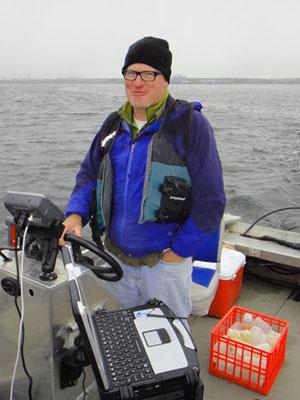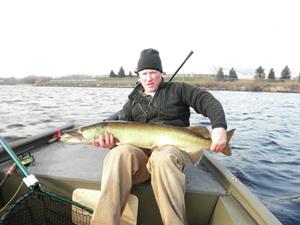Meet EPA Biologist Theodore Angradi, Ph.D.

Exploring Aquatic Ecosystems
Theodore Angradi, Ph. D., is a research biologist whose work with EPA has mostly focused on ecosystem monitoring and assessment for some of the largest rivers in the United States. Dr. Angradi has been involved in large river research for about 18 years, and has worked on the Snake River in Idaho, the Colorado River in Arizona, and the Missouri River in North Dakota.
- Environmental Monitoring and Assessment Program for Great River Ecosystems Search EPA Archive
How does your science matter?
My current research looks at the importance of restoring and protecting aquatic habitats in the Great Lakes region. These habitats have important functions, such as providing places for fish to live and grow, cycling nutrients, and providing clean water.
In the summer, I'm out on the water mapping underwater vegetation in the St. Louis river estuary that feeds into Lake Superior. The St. Louis River is an "Area of Concern," a term that refers to a location that's suffered environmental degradation. We use instruments that transmit sounds underwater, and we use the echoes to map the underwater environment. We provide information to other federal and state agencies that helps them restore these ecosystems.
When I'm not in the field, I'm crunching numbers and writing papers.
If you could have dinner with any scientist, past or present, who would you choose and what would you ask them?
I'd say Charles Darwin. His ideas are the foundation of everything we do in biology. I'd like to know when he first realized that natural selection exists. Every scientist dreams of having an insight that would provide a fraction of the influence his did.
What do you like most about your research?
I really like working with a team. Being able to get out in the field for 30 to 40 days a year is also great.

Tell us about your background.
I received my Bachelors degree in Wildlife Management from Virginia Tech University. I got a Masters degree in Wildlife and Fisheries Science from Penn State University and my Ph.D. in Biology from Idaho State University.
How did you get started at EPA?
I was working for the Forest Service in West Virginia and wanted to move on to something new. I was lucky enough to find a research position at the EPA office in Denver, where I worked until I moved with my family to my current position in EPA's research lab in Duluth, Minnesota.
When did you first know you wanted to be scientist?
I was probably in grade school. Very early I knew I would be doing something with biology. I grew up at the New Jersey shore, so I spent a lot of time splashing around in the ocean an in Barnegate Bay and learning about what I saw and how it worked.
If you were not a scientist, what would you be doing?
I'd either be a fishing guide (I'm an avid fisherman) or a boat captain. Something on the water.
Any advice for students considering a career in science?
If you are interested in science, you need to think pretty carefully about the kind of classwork you do. You'll need to know the fundamentals of statistics. If you think you're going to be a biologist, you should pick a group of organisms you are interested in and really try to learn everything you possibly can about that group. It's important not to overspecialize, but it's important not to over-generalize, too. It also doesn't hurt to volunteer and find internships to get experience.
